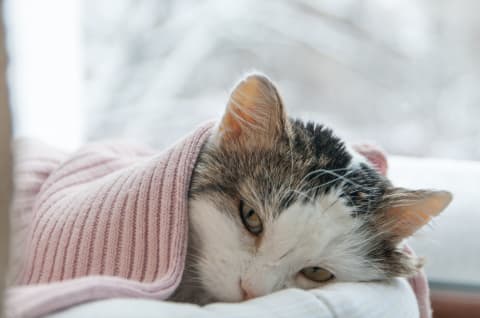Feline Upper Respiratory Infection
Feline Upper Respiratory Infection or 'cat colds' are very similar to human colds. Cat colds are typically not considered life-threatening, however, in some cases, symptoms may become severe and lead to a more dangerous secondary infection. It is especially important to closely monitor very young, or senior cats if they show signs of a cat cold.
How Cats Catch Colds
Cat colds can be viral or bacterial and are commonly passed between cats through the droplets spread by sneezing. Outdoor cats are much more susceptible to catching a cold due to their frequent contact with other cats.
Typical Symptoms of a Cat Cold
If your cat isn't feeling their best they could be suffering from a cold. Cat colds generally start with sneezing, with other symptoms appearing over the course of 24 hours. Below is a list of the most common symptoms of cat colds:
- Runny nose
- Excessive sneezing
- Excessive coughing
- Congestion leading to open mouth breathing
- Fever
- Dehydration
- Loss of appetite
- Red watery eyes
How You Can Help Your Cat Feel Better
While your cat is sick, increase humidity in your house by keeping a humidifier or vaporizer running. If your cat has a stuffy nose use a clean damp cloth or some cotton wool soaked in warm water to gently wipe your cat's nose. Cleanse and soothe your cat's watery eyes by applying a saline solution with gauze pads.
While your cat is stuffy they will have difficulty smelling food and may stop eating. Food is important for keeping your cat's strength up while they recover, so it may be a good time to buy some extra special wet cat food to tempt your feline friend to eat. Warming your cat's food may also help.
Add an extra blanket to your cat's favorite resting spots to help keep them warm and comfortable.
Signs That It's Time To Visit the Vet
Cat colds typically begin to clear up after just a few days. If your cat has been suffering from the symptoms of a cold and shows no sign of improvement within 4 days, it may be time to visit the vet.
Cat colds can lead to more serious infections if left untreated. It is particularly important to contact your vet if you have a senior cat, young kitten, or immune-compromised cat.
If you're concerned about your cat's cold symptoms, contact our Southeast Memphis vets today to book an appointment for your cat.

Looking for a vet in Southeast Memphis?
We're always accepting new patients, so contact our veterinary hospital today to book your pet's first appointment.
Related Articles View All
Signs, Causes & Treatments for Ear Mites in Cats
Ear mites cause uncomfortable irritation to a cat's ears and skin, but with diligent care, this parasite is fairly straight forward to treat. Here, we explain how to spot the signs of ear mites in cats and how ear mites can be treated.
How Long to Quarantine Dog with Ringworm
If your dog has patches of hair loss with a crusty coating, it could be ringworm. Today, our Memphis vets explain the signs of ringworm in dogs, how it is diagnosed, and how to prevent the spread of ringworm to other pets.
Why does my dog's breath stink so bad?
If you love your pup but find yourself repulsed by their breath, it's time to take action and get your relationship back on track! Our Memphis vets explain a few causes of bad breath in dogs and why it's important for your four-legged friend to see a vet for a diagnosis.
How Long Can You Leave A Dog Alone?
Most pet parents need to leave their dog alone while they head out to run errands, earn a living or spend time with friends. The question is, how long can you leave your dog alone safely? Our Memphis vets share some advice.
Your Puppy's First Visit to The Vet - What to Expect & What to Bring
You have an adorable new puppy and now it's time for your puppy's first visit to the vet. Our Memphis vets explain what you should expect during your puppy's first vet visit and what to bring along with you.
